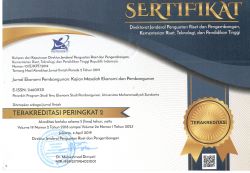Examining The Impact of Socioeconomic Status Factors on Happiness Levels in Indonesia
Intan Solikhah Indriana(1), Romi Bhakti Hartarto(2*), Ananda Raissa Putri(3)(1) Department of Economics, Universitas Muhammadiyah Yogyakarta
(2) Department of Economics, Universitas Muhammadiyah Yogyakarta
(3) Department of Economics, Universitas Muhammadiyah Yogyakarta
(*) Corresponding Author
Abstract
Keywords
Full Text:
PDFReferences
Alekseeva, L., Azar, J., Giné, M., Samila, S., & Taska, B. (2021). The demand for AI skills in the labor market. Labour Economics, 71, 102002.
An, H. Y., Chen, W., Wang, C. W., Yang, H. F., Huang, W. T., & Fan, S. Y. (2020). The relationships between physical activity and life satisfaction and happiness among young, middle-aged, and older adults. International Journal of Environmental Research and Public Health, 17(13), 1–10.
Aprilyanti, S. (2017). Pengaruh Usia dan Masa Kerja Terhadap Produktivitas Kerja (Studi Kasus: PT. OASIS Water International Cabang Palembang). Jurnal Sistem Dan Manajemen Industri, 1(2), 68.
Bagus Brahma Putra, G., & Sudibia, I. K. (2018). Faktor-Faktor Penentu Kebahagiaan Sesuai Dengan Kearifan Lokal Di Bali. E-Jurnal Ekonomi Dan Bisnis Universitas Udayana, 1, 79.
Bieda, A., Hirschfeld, G., Schönfeld, P., Brailovskaia, J., Zhang, X. C., & Margraf, J. (2017). Universal happiness? Cross-cultural measurement invariance of scales assessing positive mental health. Psychological Assessment, 4(29), 408–421.
Blanchflower, D. G., & Oswald, A. (2017). Do Humans Suffer A Psychological Low in Midlife? Two Approaches (With and Without Controls) in Seven Data Sets. In NBER Working Paper Series (23724; Working Paper).
Burger, M. J., Morrison, P. S., Hendriks, M., & Hoogerbrugge, M. M. (2020). Urban-rural happiness differentials across the world. In The World Happiness Report, Chapter 4.
Dynan, K., & Sheiner, L. (2018). GDP as a Measure of Economic Well-being. Hutchins Center on Fiscal & Monetary Pol Icy At Brookings, 43, 1–53.
Elliot, M., Cullen, M., & Calitz, A. (2018). Happiness among South African private sector physiotherapists. South African Journal of Physiotherapy, 74(1), 1–10.
Evroux, C., Spinaci, S., & Agnieszka, W. (2023). Briefing: From growth to “beyond growth”: Concepts and challenges. EPRS | European Parliamentary Research Service, May, 1–12.
Ferretto, A., Matthews, R., Brooker, R., & Smith, P. (2022). Planetary Boundaries and the Doughnut frameworks: A review of their local operability. Anthropocene, 39(August), 100347.
FitzRoy, F., & Nolan, M. (2017). Discussion Paper Series Education , Income and Happiness : Panel Evidence for the UK Felix FitzRoy Education , Income and Happiness : Panel Evidence for the UK. IZA Discussion Paper, 11185, 1–32.
Garrison, T. (2021). The Happiness Study : Identifying Social and Economic that Make the U . S . Happier The Happiness Study : Identifying Social and By. University of San Diego, Spring 5-1, 1–24.
Han, J. J., Smale, M. C., & Lee, J. (2023). How power increases preference for experiential purchases but not for material purchases. Psychology and Marketing, 40(6), 1089–1102.
Hatta, M. (2019). Media Sosial, Sumber keberagamaan Alternatif Anak Milenial Fenomena Cyberreligion Siswa SMA Negeri 6 Depok Jawa Barat. Dakwah: Jurnal Kajian Dakwah Dan Kemasyarakatan, 22(1), 1–30.
Helliwell, J. F., Huang, H., Norton, M., Goff, L., & Wang, S. (2023). World happiness, trust, and social connections in times of crisis. World Happiness Report 2023, 37–40.
Hershbein, B., & Kahn, L. B. (2017). Do Recessions Accelerate Routine-Biased Technological Change? Evidence from Vacancy Postings. In NBER Working Paper Series (22762).
Huang, R., & Grol-Prokopczyk, H. (2022). Health and health behaviors in China: Anomalies in the SES-health gradient? SSM - Population Health, 17, 101069.
Kalimeris, P., Bithas, K., Richardson, C., & Nijkamp, P. (2020). Hidden linkages between resources and economy: A “Beyond-GDP” approach using alternative welfare indicators. Ecological Economics, 169, 106508.
Kun, A., & Gadanecz, P. (2022). Workplace happiness, well-being and their relationship with psychological capital: A study of Hungarian Teachers. Current Psychology, 41(1), 185–199.
Mason, T. B., Smith, K. E., Engwall, A., Lass, A., Mead, M., Sorby, M., Bjorlie, K., Strauman, T. J., & Wonderlich, S. (2019). Self-discrepancy theory as a transdiagnostic framework: A meta-analysis of self-discrepancy and psychopathology. Psychological Bulletin, 145(4), 372–389.
Mentus, V., & Vladisavljević, M. (2021). Easterlin paradox revisited: Do increases in income bring higher levels of income satisfaction? Sociologija, 63(2), 220–235.
Putri, S., & Prasetyani, D. (2021). New Evidence of Individual Level of Happiness in Indonesia: Does Easterlin Paradox Matter? Jurnal Ekonomi Dan Studi Pembangunan, 1(13), 60–71.
Rahmi, F. (2019). Happiness at Workplace. Proceeding of Conference of Mental Health, Neuroscience and Cybersychology, 32–40.
Shrum, L. J., Chaplin, L. N., & Lowrey, T. . (2022). Psychological causes, correlates, and consequences of materialism. Consumer Psychology Review, 5(1), 69–86.
Stewart, R., Charles, M. B., & Page, J. (2023). A future with no individual ownership is not a happy one: Property theory shows why. Futures, 152(June), 103209.
Tomo, S. W., & Pierewan, A. C. (2018). Kesejahteraan subjektif dan usia di Indonesia. Jurnal Pendidikan Sosiologi, 7(4), 1–13.
Yang, D., Zheng, G., Wang, H., & Li, M. (2022). Education, Income, and Happiness: Evidence From China. Frontiers in Public Health, 10, 1–10.
Article Metrics
Abstract view(s): 1613 time(s)PDF: 1367 time(s)
Refbacks
- There are currently no refbacks.
















